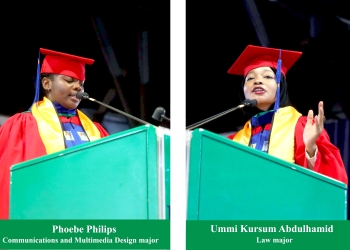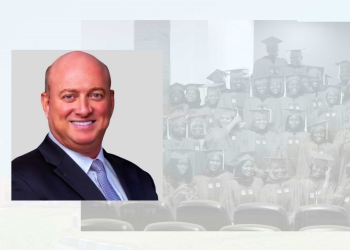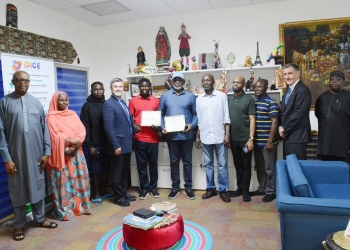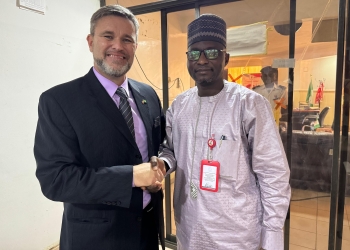The 17th of May 2025 marked the 16th Commencement Ceremony at AUN, a day to celebrate hard work, perseverance, service, and determination. This year’s ceremony was unique, as two class speakers emerged, both flawlessly delivering their stories and highlighting the journeys that shaped them.
Phoebe Philips, a Communications and Multimedia Design major, gave an emotional and inspiring speech that captured the heart of the graduating class’s journey. She recalled her early dreams of joining the military like her father and shared how her first encounter with AUN, as a curious junior school visitor, turned into a full academic journey.
“This was the only university that had the course I wanted to study, Multimedia Design,” she said. “I felt like all my dreams of becoming like my dad would never be possible, but coming here opened doors I never imagined.”
Philips also praised AUN’s strong commitment to community service. She described her involvement in projects like Feed and Read and her senior capstone project—a documentary showcasing community engagement, developed in collaboration with fellow graduate Rukayyatu. “We set new records as Stallions!” she proudly declared, referencing the university's mascot.
The second class speaker, Ummi Kursum Abdulhamid, a law major, presented a deeply reflective and inspiring account of how AUN had profoundly influenced her academic and professional path. She said, “AUN has played a pivotal role in shaping my academic and profession and I am proud to be part of this prestigious institution.”
Ummi offered a fresh perspective on fear, viewing it not as a barrier but as a driving force. Initially daunted by leaving the comfort of home and facing the unknown, she acknowledged the deep fear of not meeting expectations. However, she redefined fear as, “FEAR is an excitement in disguise, it’s your body and mind telling you something amazing, something phenomenal, that future isn’t fantasy, it could be birthed here and right now.”
This new understanding of fear broke down obstacles and reshaped her path to success. She offered powerful encouragement to her fellow graduates: “Looking at all the nostalgia we felt on our first day, yet we made it—the sense of accomplishment, the success you imagined for yourself, you absolutely can dream it into reality. But dreaming is the first step; the real magic happens when we combine our dreams with hard work, determination, and a little courage.”
Reported by; Udoh Victoria Clement,
Serving Corp Member, Marketing and Communication






